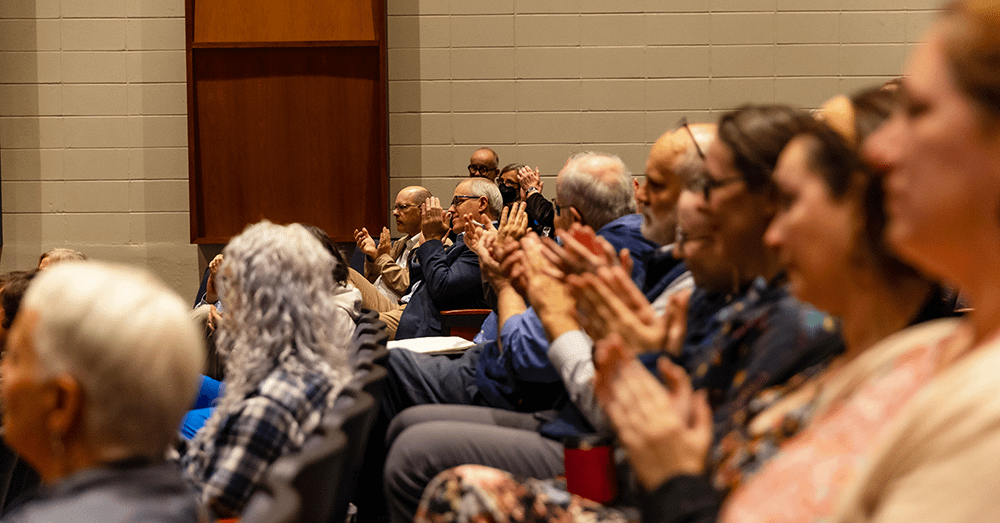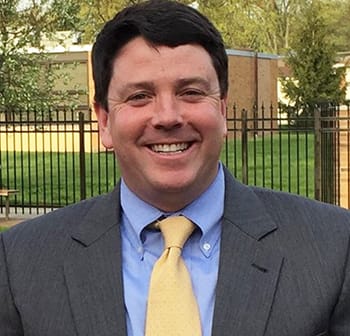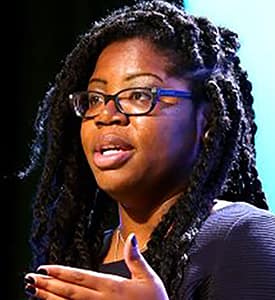U.S. Jews and Israel Lecture
Wall Lecturer Waxman's topic: American Jews and Israel
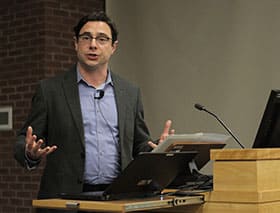
Dov Waxman gives the annual Rabbi Max B. Wall Lecture at Saint Michael’s College on March 14. Below left, St. Mike’s VPAA/Dean Jeffrey Trumbower makes introductions; an audience member during a post-lecture Q&A. (photos by Danielle Joubert ’20)
This year’s 2019 Rabbi Max B. Wall Lecture at Saint Michael’s College on Thursday, March 14, was by Dov Waxman, Stotsky Professor of Jewish Historical and Cultural Studies at Northeastern University and Professor of Political Science, International Affairs, and Israel Studies.
Professor Waxman’s topic for his talk in the Dion Family Student Center Roy Room was “American Jews and Israel: The Dissolution of Consensus.” His lecture was well attended by close to 100 students, faculty and staff, as well as members of the larger Burlington-area Jewish community and other community members.
Of the evolving relationship between American Jews and Israel, Waxman said, “It’s not that they are not attached to Israel, it’s that they are less willing to give their support automatically.”
This lecture series is held in honor of Rabbi Max B. Wall, the first Jewish Rabbi to teach at Saint Michael’s College. Both his undergraduate and graduate courses dealing with subjects such as “Judaism and the History of Jews in the United States” or “The Making of the Modern Jew” were consistently popular. He was also responsible for the development of the Judaica Collection in the College’s Durick Library, and received an honorary degree at the 1981 Commencement exercises. The Wall Endowment Fund, established by friends of Wall in 1983, sponsors public lectures on Judaism, ensuring the continued legacy of Rabbi Max B. Wall’s teachings.
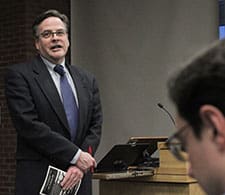 This year’s speaker Waxman, introduced by Saint Michael’s Vice President for Academic Affairs and Dean Jeffrey Trumbower, also is the director of the Middle East Studies program at Northeastern. His research focuses on the Israeli-Palestinian conflict, Israeli politics and policies, as well as U.S.-Israel relations and the American Jewish relationship with Israel. He has written several books, including The Pursuit of Peace and the Crisis of Israeli Identity: Defending/Defining the Nation (Palgrave) among others, and his new book The Israeli-Palestinian Conflict: What Everyone Needs to Know, will be published by Oxford University Press in May 2019.
This year’s speaker Waxman, introduced by Saint Michael’s Vice President for Academic Affairs and Dean Jeffrey Trumbower, also is the director of the Middle East Studies program at Northeastern. His research focuses on the Israeli-Palestinian conflict, Israeli politics and policies, as well as U.S.-Israel relations and the American Jewish relationship with Israel. He has written several books, including The Pursuit of Peace and the Crisis of Israeli Identity: Defending/Defining the Nation (Palgrave) among others, and his new book The Israeli-Palestinian Conflict: What Everyone Needs to Know, will be published by Oxford University Press in May 2019.
Waxman spoke specifically about the relationship American Jews have with Israel, and how it has changed since World War II. According to Waxman, the Holocaust profoundly changed American Jewish support for a Jewish state. In the years after the war, in some ways, supporting Israel was the only thing many American Jews had in common, he said, and it functioned as a way to express one’s Jewishness. American Jews supported Israel financially and politically, and were readily willing to give whatever support Israel needed. However, according to Waxman, this attitude of automatic support for Israel has changed, in many ways due to the Israeli-Palestinian conflict.
In a survey of American Jews conducted in 2013, nearly half of those surveyed believed that the Israeli government was not making enough of an effort to make peace with the Palestinians, he said. American Jews are becoming more divided about the Israeli Government’s policies, especially related to Palestine, and are becoming more willing to publicly criticize them. More American Jews are willing to argue about what supporting Israel means. However, this does not mean that American Jews are becoming unattached to Israel, the speaker said.

One of the main take-aways from the talk was that young Jews especially are engaged with their Jewish identities simply by virtue of the fact that they want to know what’s going on with Israel, whether that means criticizing or supporting. A spirited question and answer session followed his


